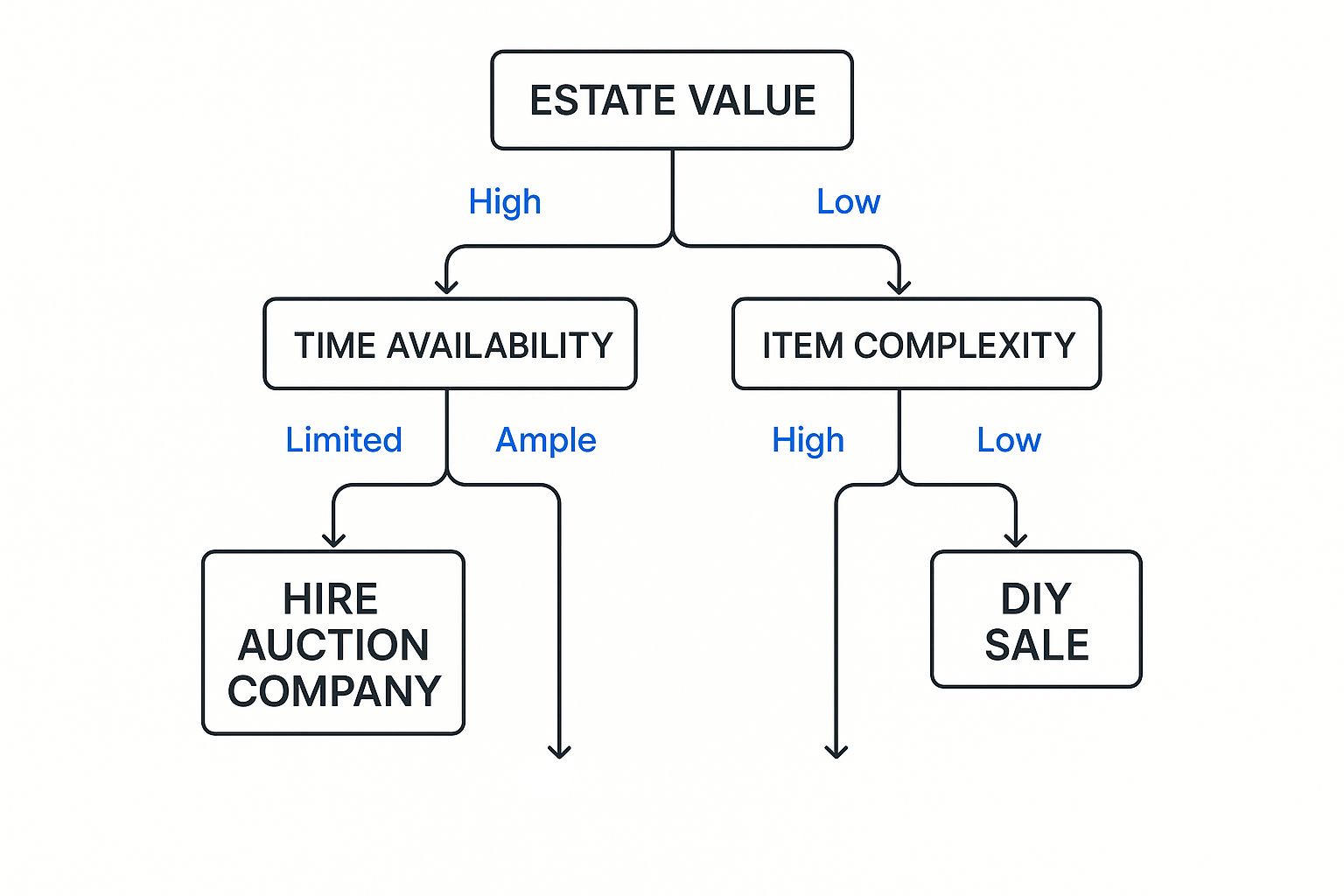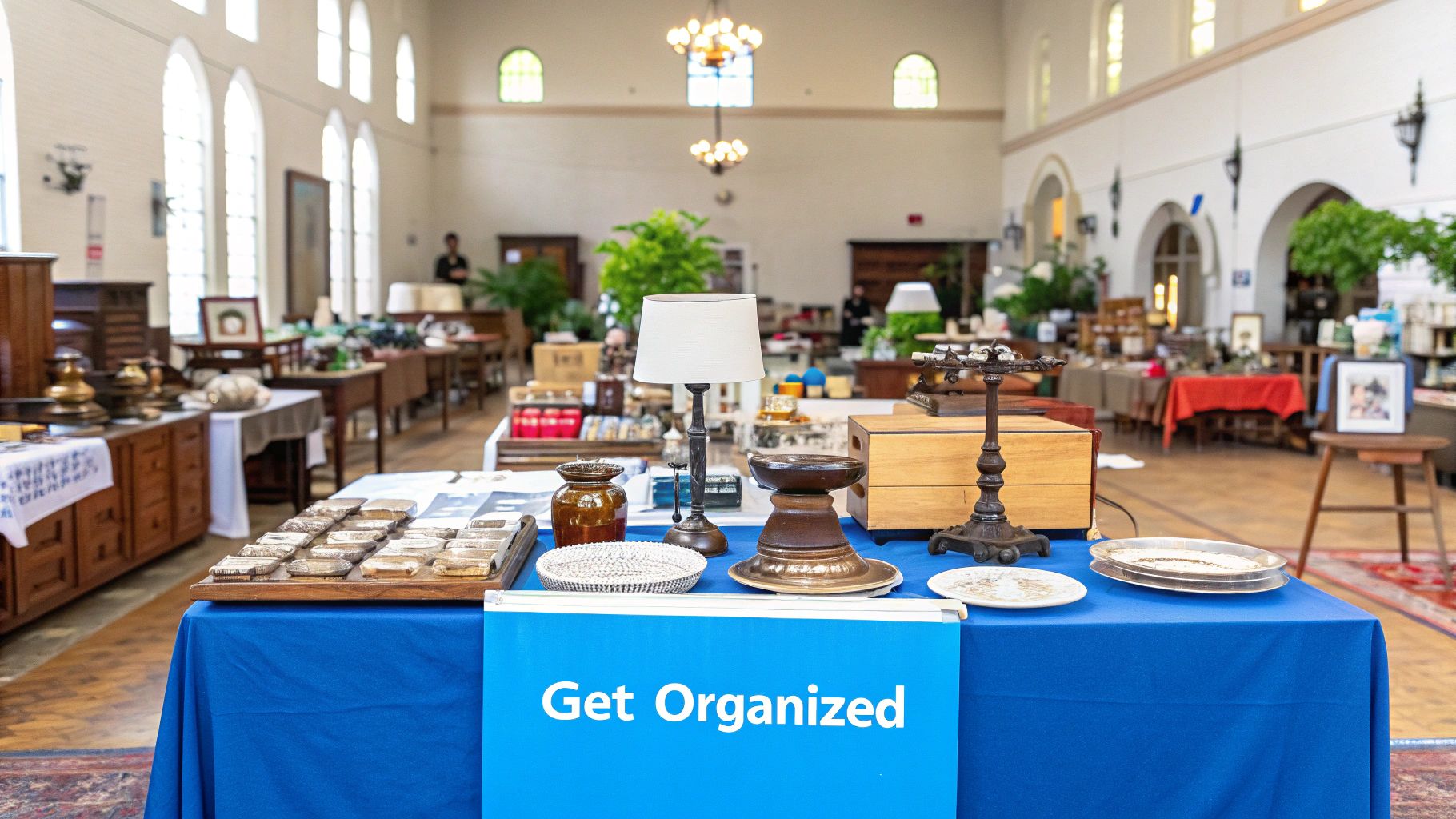Finding the Right Estate Sale Auction Companies

So, you're facing an estate sale. It's an overwhelming task, and the first big question is always the same: Should you try to handle it yourself or bring in the professionals?
Let's be clear: estate sale auction companies are often the best choice, especially when you're dealing with high-value collections, a massive volume of items, or you simply don't have the time and expertise to do it right. But a DIY approach can work for smaller, more manageable estates if you've got the time and energy to spare.
DIY or Hire a Pro? Making the Right Call
Deciding whether to hire an estate sale auction company or go it alone is all about taking a hard, honest look at your situation. It’s a trade-off between how much you could potentially earn versus how much time, effort, and stress you’re willing to invest. There's no single right answer—it all comes down to the specifics of the estate you're managing.
For many people, the sheer amount of stuff is the tipping point. An entire household of furniture, decor, tools, and personal belongings can easily take hundreds of hours to sort, price, and sell. This is where the pros really shine, handling every single detail from staging the home to the final clean-up.
How Complex is the Estate?
Think about the actual items you're dealing with. A house filled with everyday furniture and kitchenware is a completely different ballgame than an estate that includes specialized collections. Are there items like fine art, rare coins, antique firearms, or designer jewelry in the mix?
Professionals have the training and experience to spot these high-value items and appraise them accurately, which prevents you from accidentally selling a treasure for pocket change. More importantly, they have established networks of collectors and niche buyers who are ready to pay top dollar—a market that's nearly impossible for an individual to tap into. This is a huge advantage in the auction house market, which was valued at a staggering $17.69 billion globally in 2021. The United States is a major player, accounting for over 81% of the dominant North American market. You can learn more about the auction house market's growth and trends to see just how big this industry is.
This visual guide can help you think through whether a professional company or a DIY sale makes more sense for you.

As you can see, if you're looking at a high-value estate with complex items and you're short on time, all signs point to hiring a professional to get the best results.
What Are Your Personal Resources?
Finally, you have to be realistic about what you can handle personally. Running an estate sale isn't just a logistical puzzle; it can be an emotional minefield, especially if you're grieving the loss of a loved one.
The most overlooked cost of a DIY estate sale is the emotional toll. A professional company creates a necessary buffer, allowing you to focus on personal matters while they handle the business of liquidation with efficiency and objectivity.
Your time is also a precious resource. Ask yourself:
- Do I really have the weeks it will take to sort, research, price, and market everything?
- Am I prepared to negotiate with dozens of strangers and manage a crowd in the home?
- Do I have the physical stamina to move furniture, set up displays, and handle the final clean-out?
If you answered "no" to any of these, then partnering with a reputable estate sale company is a smart move. They bring the experience, the resources, and the objective perspective needed to maximize your return while minimizing your stress.
DIY Estate Sale vs Hiring an Auction Company
To help you decide, here’s a quick-glance comparison of the two approaches. Think about which column aligns best with your specific needs, timeline, and the nature of the estate.
| Factor | DIY Estate Sale | Professional Auction Company |
|---|---|---|
| Effort & Time | Very high. You handle all sorting, pricing, marketing, and sales. | Very low. They manage the entire process from start to finish. |
| Cost & Fees | No commission, but you pay for all supplies, marketing, and labor. | Commission-based (25% to 45%), often with a minimum fee. |
| Expertise | Relies solely on your own knowledge of item values. | Access to certified appraisers and market specialists. |
| Potential Return | Lower. Risk of underpricing valuable items and limited buyer reach. | Higher. Broader marketing and access to niche buyers maximize prices. |
| Speed | Can be slow and drawn out over weeks or months. | Fast and efficient. The entire process is typically done in 1-2 weeks. |
| Stress & Liability | High. You're responsible for everything, including security and safety. | Low. The company handles logistics, security, and liability insurance. |
Ultimately, the table highlights a key trade-off: a DIY sale saves you the commission fee, but a professional service often generates a higher net profit through expertise and efficiency, all while saving you an immense amount of work and emotional strain.
How to Research and Shortlist Companies

Okay, you’ve decided to hire a professional. Smart move. Now comes the most important part: finding the right one. This isn’t about a quick Google search for local estate sale auction companies. The goal is to build a short, highly-vetted list of potential partners who truly fit your specific needs.
Start by casting a wide net. Ask people you trust—estate attorneys, real estate agents, or financial planners often have a go-to list of reputable companies they've worked with before. At the same time, check out industry resources like the National Auctioneers Association (NAA) to find credentialed members near you. This first pass should give you a solid starting list of five to ten names to investigate.
Verifying Credentials and Reputation
With your initial list, it's time to do some real homework. The absolute first thing to check is their credentials. Don't even think about hiring a company that isn't fully licensed, bonded, and insured. This isn't just about them looking professional; it's about protecting you.
- Licensing: This confirms they’re legally allowed to operate in your state.
- Bonding: This is your financial protection if the company acts unethically or fails to deliver on its contract.
- Liability Insurance: This covers any accidents that might happen on the property during the setup or sale.
Don't just take their word for it. Ask them to provide proof. A legitimate company will have this information ready and won't hesitate to share it. Also, look for affiliations with respected industry groups like the NAA. While not mandatory, it’s a good sign that they're serious about their profession and adhere to a code of ethics.
Next, it’s time to see what past clients are saying. Go beyond the star ratings on Google or the Better Business Bureau. Read the actual reviews from both sellers and buyers. Are people consistently praising their communication and transparency? Or are you seeing a pattern of complaints about disorganized sales, low returns, or hidden fees?
One bad review can be a fluke. But a clear pattern of the same complaints is a massive red flag. Also, pay attention to how the company responds to negative feedback. A professional and constructive response shows a lot more character than a defensive or dismissive one.
Making the First Contact
By now, your research should have helped you narrow the list down to three to five strong contenders. It's time to pick up the phone. This isn't the full-blown consultation—think of it as a quick screening call to get a feel for their professionalism and see if they’re even a potential fit.
Keep these calls short and to the point. You just need to confirm they're available, get a basic rundown of their process, and gauge their communication style. If they sound vague, rushed, or dismissive on this first call, it's an easy "no."
To keep things fair and make comparisons easier, ask every company the same initial questions.
Essential Screening Questions:
- Can you confirm you are licensed, bonded, and insured to operate here?
- Do you have recent experience with estates similar to ours (in terms of size and the types of items)?
- What’s your general commission structure? (You’ll get into the details later, but you need a baseline).
- Are you able to provide a few references from recent clients or an estate attorney?
- What's the next step for a no-obligation consultation at the property?
Their answers will tell you everything you need to know to finalize your shortlist. The companies that are transparent, confident, and professional are the ones you’ll invite for a face-to-face meeting. This methodical approach is the best way to find a true partner for your sale.
Decoding Commission Structures and Hidden Fees

Let's talk about the money. This conversation can feel a bit awkward, but it's the most important one you'll have with any potential estate sale company. Getting this part right from the start is the key to a successful partnership, ensuring there are no nasty surprises when you get your final check.
Most companies you talk to will work on a commission-based fee, which usually falls somewhere between 25% and 45% of the total gross sales. This model is popular for a good reason—it gives the company a powerful incentive to sell your items for the highest price possible. When they make more, you make more. But this is also where the details really start to matter.
Understanding Commission Models
You'll quickly find that not all commission structures are created equal. Some companies prefer a flat-rate commission, which is simple and straightforward. They take a set percentage—say, 35%—on everything that sells, no matter the final total. Easy to understand.
Others use a sliding-scale commission. With this model, the percentage they take changes as the total sales grow. For instance, they might charge 40% on the first $10,000, 35% on the next $10,000, and 30% on anything above $20,000. If you have a large estate, this can be a huge advantage, as your fee rate actually drops as your earnings climb.
Always run the numbers for your specific situation. The company with the lowest advertised rate isn't automatically the best deal, especially if their sales strategy can't deliver a high final total. If you want to get a better handle on the financial side of things, our guide on what is estate liquidation breaks down the entire process.
Shining a Light on Hidden Fees
The commission rate is just the beginning of the story. The real threat to your bottom line often comes from "additional fees" that aren't always discussed upfront. A beautifully low commission rate can lose its shine fast when you realize you're being nickel-and-dimed for every little service.
These extra costs can pile up, potentially eating up thousands of dollars of your profit. You absolutely must get a complete list of all possible charges before you sign a contract.
The most reliable estate sale auction companies operate with total transparency. They will provide a clear, itemized list of all potential costs in their contract, ensuring there are no financial surprises after the sale concludes.
Here are the most common "hidden" costs you need to ask about directly:
- Marketing and Advertising: Is promoting the sale included in the commission? Some companies charge a separate flat fee or a percentage for creating online listings, running social media ads, and print advertising.
- Labor and Staffing: Find out if the commission covers the crew needed for sorting, staging, pricing, and running the sale. You should ask specifically about setup days, sale-day staff, and post-sale cleanup.
- Credit Card Processing: Buyers love paying with plastic, but that comes with a transaction fee, typically 2-3%. Who pays for that? Is it taken from the gross sales before your split, or does it come out of your share?
- Trash Hauling and Disposal: What happens to the stuff that doesn't sell? Be wary of companies that charge hefty fees to haul away unsold items and trash.
- Specialized Appraisals: If you have fine art, high-end jewelry, or rare collectibles, an outside expert may be needed for a proper valuation. Clarify who is responsible for that cost.
By asking these pointed questions, you can truly compare apples to apples when looking at proposals from different estate sale auction companies. Your goal isn't just to find a fair price, but to find a partner who values complete transparency. That's how you sign a contract with confidence.
What to Look for During the Consultation
This is where the rubber meets the road. The in-person consultation is your chance to see past the slick website and glossy brochures. You get to size up the company's real-world expertise and see if they're the right fit for your estate. Think of yourself as the hiring manager—you’re entrusting them with a lifetime of possessions.
Pay close attention as they tour the home. A true pro won’t just give furniture a passing glance. They’ll be looking for a maker’s mark on the bottom of a chair, checking the joinery on a dresser, and identifying design periods. Their eyes are trained to spot hidden gems in a room full of ordinary items.
Are they handling things with care? Do they pause to examine a piece of jewelry instead of lumping it all together as “costume”? A real expert will notice the unassuming mid-century pottery on a dusty shelf or the collection of vintage woodworking tools in the garage, because they know exactly what those things are worth to the right buyer.
Asking the Right Strategic Questions
Of course, you need to talk about their commission, but the consultation is the time to dig much deeper. You need to understand their strategy for your sale. This is what separates a basic liquidator from a marketing powerhouse that will get you top dollar.
Come prepared with a few pointed questions:
- How do you value unique items? Ask them how they approach things like art, coin collections, or antiques. Do they have in-house specialists, or do they work with outside appraisers?
- What's the best auction format? For your specific items, should it be a live, online, or hybrid auction? Make them explain why their recommended format will get the best results.
- Show me your marketing plan. Ask them point-blank, "How will you market this sale to attract the right buyers?" Don't settle for a vague answer. Ask to see examples from past sales similar to yours.
- How big is your audience? What’s the size of their email list and social media following? How do they reach local bidders versus serious collectors across the country?
Their answers should be specific, confident, and backed up with proof. If you get a lot of "it depends" or one-size-fits-all responses, that's a major red flag.
The best estate sale professionals don't just sell "stuff"; they curate an event. Their ability to tell the story behind unique items and market them to a targeted audience is what elevates an ordinary sale into a highly profitable auction.
Evaluating Their Digital Marketing Prowess
In today's market, an auction is only as good as its online reach. The ability to find bidders from all over the world isn't just a nice-to-have; it's essential for getting the highest prices. The global online auction market was valued at around $5.25 billion in 2023 and is on track to nearly double. That tells you everything you need to know about the power of digital. You can see more on the explosive growth of the online auction market on dataintelo.com.
During the consultation, ask them to show you their digital strategy in action.
- Do they use professional, high-quality photos and write compelling descriptions for their online catalogs?
- Are they active on social media platforms where collectors and enthusiasts hang out?
- Do they run targeted online ads to find niche buyers for specific categories of items?
A company that invests heavily in its digital presence is a company that's investing in your success. They know the highest bidder for that rare book might be three states away, and they have the tools to find them. For a closer look at what separates the best from the rest, check out our guide on the professional estate sale process.
Ultimately, the consultation is about finding a partner you can trust. You’re looking for a team that combines deep appraisal knowledge with a smart, modern marketing engine. When you review their proposal, don't just look at the commission rate—look at the entire strategy and the level of care they’ll bring to your estate.
Preparing Your Estate to Maximize Value
Once you’ve hired one of the top estate sale auction companies, your role isn't over—it just shifts. While they're handling the heavy lifting of logistics and marketing, a bit of prep work on your end can make a huge difference in the final sales total. Think of it as a partnership.
The first and most important rule is surprisingly simple: do not throw anything away.
It’s a common impulse to want to "clean up" before the pros arrive, but this is exactly where costly mistakes happen. That box of old postcards? The tangled mess of costume jewelry? Even those rusty tools in the garage could hold surprising value for the right collector.
Remember, these professionals are trained to spot hidden gems. What looks like junk to an untrained eye might be a sought-after vintage find. Trust their expertise to sort the treasure from the trash.
The Power of Provenance and Paperwork
For your most valuable items, documentation is everything. The story behind an object—its history, or provenance—can add thousands to its price tag at auction. Before the company starts cataloging, spend some time hunting down any related paperwork.
Look for things like:
- Original receipts for furniture, art, or jewelry.
- Certificates of authenticity for artwork or signed memorabilia.
- Appraisal documents from past valuations.
- Handwritten notes or old letters that mention an item's history.
Finding a receipt that proves a desk is a genuine mid-century modern classic can be the difference between it selling for $200 and $2,000. This paperwork gives bidders the confidence to pay a premium because it provides concrete proof of an item's legitimacy and value.
Setting Aside What Stays
Before the team arrives to start staging, it is absolutely crucial to identify and separate any personal items your family intends to keep. This simple step prevents heartbreaking mix-ups and keeps the whole process stress-free.
The best way to do this is to pick one room or a cordoned-off corner and move everything you're keeping there.
Put up clear signs like "Not For Sale" or "Family Items." Just as importantly, point this area out to your auction company contact so their team knows to avoid it completely. This little bit of organization protects your cherished heirlooms from being accidentally priced and sold.
The most successful estate sales are always a collaboration between the family and the auction company. Your effort in preserving items, finding documents, and clearly marking what stays lays the foundation for a highly profitable and seamless event.
By taking these steps, you're not just clearing a path for the professionals; you're actively boosting the financial success of your sale. This small investment of time can yield a significant return. If you want to learn more about the organizational side of things, check out our guide on how to run an estate sale for more insights. Your proactive involvement helps the auction company tell a richer story, attract more bidders, and ultimately, maximize the value of the estate.
Handling Specialized Assets and Collections

Let's be honest—not everything in an estate is created equal. If the home you're clearing includes fine art, a classic car, or a prized coin collection, your standard liquidation strategy just won't cut it.
These aren't your everyday household goods. They're high-value assets that need more than a generalist's eye; they demand the deep knowledge and established network of a true specialist.
Putting a valuable painting or a vintage Rolex into a regular estate sale is a guaranteed way to leave a huge amount of money on the table. A general liquidator likely won't recognize its real market value or have the right contacts. This is where professional estate sale auction companies really show their value, by connecting your most important pieces with the right buyers who will pay top dollar.
Finding Niche Buyer Networks
The secret to getting the best price for specialized assets is reaching a targeted, often global, audience. A company with a proven track record in a specific category—whether it's antique firearms or designer handbags—has spent years building a network of serious bidders. They know exactly who to call.
Selling specialized collections isn't just about finding one buyer. It's about creating a competitive bidding war among the right buyers. A specialist auction house markets the story and rarity of an item to an international audience, often driving prices far beyond what anyone initially expected.
These firms use marketing strategies that go way beyond a local ad. Think high-quality online catalogs with professional photos, targeted digital ad campaigns, and leveraging their reputation to pull in bidders from all over the world. It’s a focused approach you need to get true market value.
The Power of Specialized Platforms
This specialized approach isn't just for collectibles. It works for other high-value assets, too, like real estate. The luxury real estate auction market, for instance, was valued at $1.43 billion in 2024 and is expected to hit $2.08 billion by 2032. This market is booming because it directly targets ultra-high-net-worth individuals—a group that grew by 7.5% globally in 2023. You can dig into more details on the luxury real estate auction market over at 24marketreports.com.
When you're interviewing companies for an estate with unique collections, don't be shy. Ask them to show you the results from past sales of similar items.
Look for proof of:
- Expert Appraisals: Do they have in-house specialists or do they partner with certified appraisers for your specific type of asset?
- Targeted Marketing: Can they show you exactly how they marketed a similar collection to a niche audience?
- Global Reach: What online platforms do they use? Ask for data showing they can attract international bidders.
Choosing a company with this kind of expertise ensures your most precious assets aren't just sold—they're showcased, celebrated, and ultimately sold for the maximum price possible.
Common Questions About Estate Auction Companies
Even after you've picked a company to work with, a few practical questions almost always come up. Getting these details ironed out ahead of time helps set the right expectations and gives you peace of mind as the sale gets closer.
What Happens to Unsold Items?
This is easily one of the most common questions we hear. What do we do with everything that doesn't get a bid? Any reputable estate sale auction company will have this clearly spelled out in your contract before you even sign.
You'll usually have a few options:
- Charitable Donation: The company can arrange for a non-profit to pick up what's left, and you'll get a tax-deductible receipt.
- Clean-Out Service: For an added fee, their crew will simply haul everything away. This leaves the property totally empty and broom-swept, which is a huge help if you're trying to sell the house.
- Bulk Sale: Sometimes, whatever remains can be sold in a single lot to a reseller or liquidator.
How Long Does The Whole Process Take?
Another big concern is the timeline. How long from the day I sign the contract until I actually get paid? While every estate is unique, a good rule of thumb is about three to four weeks. That window covers everything—cataloging and photographing items, marketing the sale, running the auction, and coordinating the pickup day for buyers.
Once the auction is over and all the winning bidders have paid up, you should expect your final settlement check and a detailed report within 7 to 14 business days. That report is a fantastic resource, as it breaks down every single item sold and the final price it fetched.
Finally, clients often ask if they need to be on-site during the auction itself. The answer is almost always a firm no. In fact, most professionals prefer the family isn't there. It lets them run the event smoothly and avoids any emotionally tough moments for you or potential awkwardness for the buyers.
Your job is to step back and trust the pros you hired to do what they do best.